
We change the coloring a bit on photoshot, here some better quality scans. You can find the original ones in this gallery
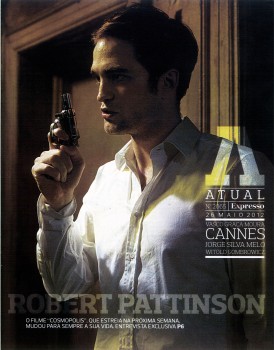
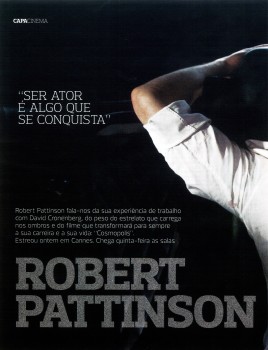

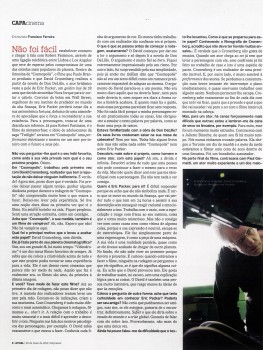
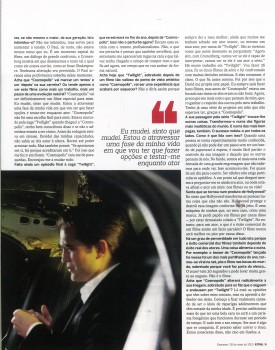
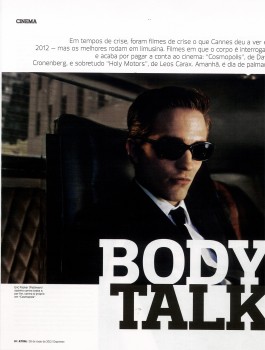
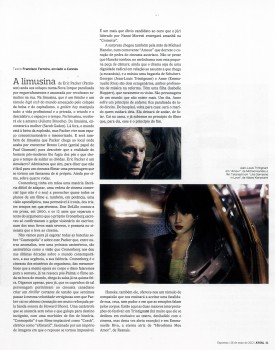
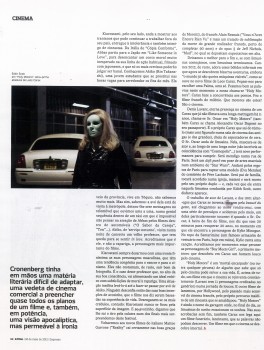
Translation - Thanks so much to Bee for helping with the translation
It wasn't easy to estabilish contact with Robert Pattinson, during a phonecall between Lisbon and LA, that had to wait for the commitments of one of the most popular actors in the world. Inside the limousine of "Cosmopolis", film that Paulo Branco produced and David Cronenberg directed, from the novel by Don DeLillo, the british actor became Eric Packer, a 28 year old golden boy that decides to cross New York to get a haircut. Wall Street stockbroker, proud of his great instinct on the world of high finance, Eric Packer will lose on that day his wealth, under an apocalyptical atmosphere that makes him reconsider his existence. To the character, it's like going to hell. But to Robert Pattinson, it's the movie where things will change: the teen idol from the Twilight Saga gives in 'Cosmopolis' an electrifying performance and shows that he's a complete actor with a great future.
I'm not going to ask you about your favorite hobby, how's your personal life or what is your next project.
Great.
In 'Cosmopolis', you worked for the first time with David Cronenberg, director known for not letting anyone indifferent.
Is it true? Now I can say that it is true. I needed some time and distance because during the shooting of Cosmopolis I didn't understand very well what I was doing. I only understood that when I watched the movie for the first time. I was alone in the room. I was perplex. I had a strange feeling, like a contagion.
Do you think 'Cosmopolis', in its own way, is also a movie about vampires?
Oh no. I hope not! There are no vampires here.
What was the main reason that made you accept this part?
David Cronenberg, no doubt.
He was part of your cinematographic world?
Yes, I've been a big fan, for a long time. "Videodrome" is one of my all-time favorite movies. I knew that he always put his creativity above everything and that this project could become a lifetime experience. He's one of those rare filmmakers that seems to be not afraid of anything. What he does is really his, his movies, from the first to the last scene.
And you? Were you afraid to make this movie?
Until the first day, I can't say that I wasn't scared. Most directors try to guide the actors by the hand. They give them directions all the time, make them a puppets. With Cronenberg everything is different and automatic. We got to the end of shooting, filmed and... that's it. The relationship with the work is very much a sensory experience and the hardest thing is learn how to set the right tone. No one tells us the psychological reasons of the characters, for example. David knew exactly what he was doing. He knew the script by heart. I had never worked with a director so confident in himself.
What exactly happened before filming?
David first gave me the script to read and then I read Don DeLillo's novel. The script is very true to the book. I was extremely impressed by its rhythm. But I was also surprised by the simplicity, because people had told me that Cosmopolis wasn't an easy book, a novel impossible to adapt to the screen. David's script was like a poetry. I wasn't sure what I was supposed to do, where to go or even how the story was going to end. And the more I read, more questions seemed to stay without answers. It wasn't easy because my character is in every scene. That made me study the script word by word, like it was theatre.
Did you know DeLillo's work? Were his books your bedtime reading?
Not really. I had read some of his books, but nothing about 'Cosmopolis' or Eric Packer.
Did you learn more about yourself as a man and an actor with this part?
Oh yes, my debt is endless. I found out that you can't do the same for the rest of your life. With that, I don't wan't to say that I saw myself in this character. He's nothing like me.
Who is Eric Packer?
It's hard to answer because I don't think he symbolizes anything. He knows he moves in the world of finance, that he will lose everything in 24 hours and watch his own destruction without being able to rationally and emotionally react. He works with the void, with speculation and reacts with coolness to his instincts, something that makes him very mysterious. But I can't see him either as cause or as a victim of something, because his expression is neutral, he escapes stereotypes. He's just part of a gear, it's like he's part of a machine. His life is a parallel reality, almost as if he had just arrived from another planet. Basically, he doesn't know how to live in the present because he devours the present. It's curious that when we were filming the movie, no one in the set wondered what he meant, if he actually meant anything. I think David brought this. He likes to work like this, in the dark, without any logical explanation to things. David is a very instinctive person who reacts less to the ideas than to emotions.
Let me ask this again, a different way: do you think you would want to meet Eric Packer? Could you be his friend?
I don't think I could be his friend, but yes, if he was a real person, I would definitely like to meet him. To know what he would say about the world today and the global crisis. I would like to talk to him about that. Probably only once.
You just told me about the difficulty of the text. How did you prepare for the part? Knowing Cronenberg’s movies, I believe there weren’t many rehearsals …
It’s true. Cronenberg doesn’t like rehearsals. When an actor arrives on set you have to bring your character with you, the confrontation has been done at home and it's kind of a pact. Cronenberg is a director of an incredible exactitude. And, on the other hand, very sensitive about the actors’ performances. If we lose focus for a brief moment he interrupts the shot immediately, it’s almost nerve-wracking to work with someone like that. No detail will escape him. Cronenberg knows exactly how the take is going to be like by the end of the day, which ones will come first and which ones will come after: he arrives on set with the movie completely set up.
But, for an actor, there are scenes harder than others: I remember the sex scene in the limousine, for example.
For me it was a very strange moment. I have that scene with Juliette Binoche, of whom I've been a fan for a long time. We had never talked before. She arrived in Toronto one morning and in the afternoon we had to film the sex scene in the limousine. It was a little scary.
In the last part of the movie, you work with Paul Giamatti, one of the best and greatest actors of your generation. Didn’t that intimidate you?
It didn’t intimidate me, but it increased the tension. Paul wasn’t less tense than me. It’s a crucial moment in the movie, a big confrontation dialogue, and Cronenberg insisted that we would say the line the way it was written, like it was Shakespeare. No changes were allowed. Paul gives an amazing performance in that scene.
Do you think Cosmopolis will be a ‘before’ and ‘after’ mark in your career? Or does it seem like just another job, another natural step?
“Cosmopolis” will definitely be an important movie for me. I’ve changed, and I feel the change. I’m going through a phase in my life that I will have to make choices and test myself as an actor. “Cosmopolis” wasn’t an easy choice for me. I was labeled by the ‘Twilight’ saga when I got to “Cosmopolis”, and I am aware of that, I’d be cynical if I said otherwise. Before the shooting I was so distressed. I doubted my capability, didn’t know if I’d be good enough. I thought I was going to ruin everything. But then I thought: “If they bet on me, it’s because they believe in me.” “Cosmopolis” fell on my lap. It encouraged me to change everything.
There’s still a final episode of the “Twilight” saga, that will be released by the end of the year, after “Cosmopolis”. Doesn’t that bother you now?
I face the release with the same professionalism. No, what bothers me it’s to think I grew old, that I have wrinkles on my face and maybe it’s time to break off from what I’ve done until now, a time that I will accept naturally.
Do you think today, that ‘Twilight’ especially after a valuable movie like Cosmopolis, from an artistic point of view will be an experience that will be forgotten?
I wouldn’t say yes because I’ve always given my best, even if a lot of people thought of me as a small actor, or even as a bad actor because of “Twilight”. They’re the same voices asking themselves: “Now, with Cronenberg, we’ll see if he’s capable of acting, we’ll see if he’s a serious actor.” There’s a lot of work in Twilight. I’m turning 26, I was in five movies of the series and I was confronted by a lot of artistic decisions. And they counted, of course. What I did before counted. And that’s why David offered me the part. I’ve always wanted to make good movies, but before “Cosmopolis” I was a bit worried if they were good or not. Now I worry about what they think of me, I want to gain respect from others because of my work. I have a series of projects in hands, that I wasn't expecting to get, thanks to “Cosmopolis”.
Your transition through the Twilight series brought you a lot of things. It made you become a media figure of the world. And one of the best well paid as well. Success is around you. How do you deal with that?
When a person suddenly becomes well known, when you can’t step outside without a paparazzi waiting for you, it's very easy to lose control of your image and of what other people think of us. Deep inside we’re just a cogwheel of a big gear and we don’t know where it's going. It happened to me. It was almost overnight. Being a celebrity doesn’t require aptitude. At a certain point I asked myself if I was still an actor, or where was the actor in me: in the movies or in my life?
Do you feel like you’ve become a Hollywood product?
I feel like Hollywood changes people in something they’re not. Hollywood protects and destroys that image the way it works better for it. It’s a dream machine, in my case, it created a label. I’ve lost parts in movies for being related to Twilight. Although, for an actor, what’s a commercial success if not a parallel fact? The movie won’t be better or worse because of that.
There’s a perverse side in everything because the success of the movie also depends of the real success of the actors. For example: Cosmopolis teaser trailer, released months ago was one of the most watched and shared on the internet. The movie was being talked about by everyone, especially because you’re part of it…
The teaser is 30seconds long and it can lead people to believe something else. It’s not the movie.
Do you think Cosmopolis will change radically your image, especially for the fans that follow and worship “Twilight”?
There it is: the opinions they have about me count, but I learned to protect myself from them. I start to feel really tired of being the idol of teenage girls, girls that are half my age. You need to want to have more than a pretty face on the screen or photogenic charisma that worked for quite a long time. You have to know how to take risks. I’m aware of that and I don’t fall for illusions.
Scans










No comments:
Post a Comment